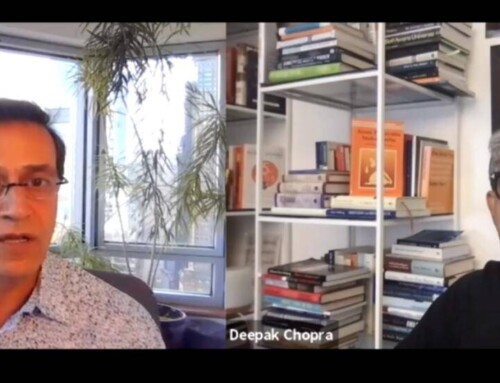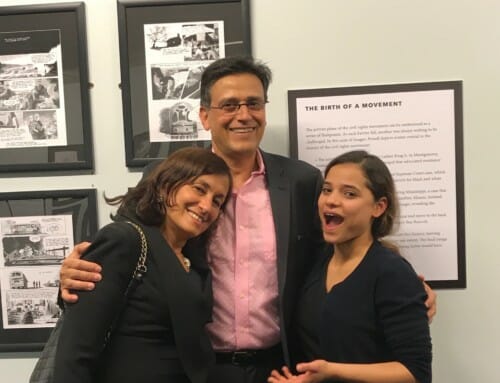By Gerard Senehi
“Evolution is a light illuminating all facts, a curve that all lines must follow.”
— Teilhard de Chardin, The Phenomenon of Man
The word evolution is popping up everywhere these days. We hear of businesses evolving, cars evolving, thinking evolving, consciousness evolving. I even heard a fitness trainer telling an obese woman on a TV show that she had to be ready to evolve! It seems that more and more people are realizing that there is much more to evolution than just the mutation of species that we’ve understood at the level of biology.
Of all the diverse fields in which we are beginning to recognize the processes of evolution at work, the one I am particularly interested in is the evolution of culture. And I’m using that term in a particular way. As bestselling author Carter Phipps explains in Evolutionaries:
“Often when we use the term ‘culture,’ we think of its many outward expressions — music, art, fashion, or social and political institutions. But another way to think about culture is to see it as a dimension that exists inside of us — the interior of the collective … It is where meaning, values, and agreements live — a real, internal world that is … part of the evolutionary dynamics of the universe.”
Understanding culture in this sense is particularly important right now, because many people feel our society has reached an impasse in addressing questions of values and meaning. We recognize that young people often lack a contemporary source for values and meaning, and yet we do not know where to turn to find that. We also know there are concerns with values and truth in politics but feel empty-handed about how to deal with it. Similarly, we witness a host of issues with ethics in business, but often our only recourse is to respond at the level of policy.
There is a reason for this impasse. We generally have two fundamental ways of considering meaning, values, and morality, which many great thinkers have explored and debated, but each is inherently limited.
On one hand, we believe that there is a singular perspective on values, meaning, and morality, which is objective. We imagine or posit that there is a pre-determined, objective, fixed and final perspective to how we define meaning in life and what we value. From this assumption or fundamental position, people either feel they have already discovered this source of meaning and values, or they imagine that their search will eventually lead to the discovery of something fixed and final. This position implies that there is only one correct view and consequently, if one is right, other people or perspectives must be wrong.
To many, this approach may sound outdated and over-simplistic. And it is. But it’s important to appreciate that historically, this position as it relates to values and morality, made a very important contribution. It created critical shared cultural agreements that helped to scaffold moral order (e.g. “Thou shalt not kill”).
However, we now witness how much conflict this approach to morality creates around the world. We can see how the insistence on one’s point of view as ultimate and objective has led to bloody conflicts and how it manifests in our own backyard as an extreme polarization between Republicans and Democrats, impeding the creation of common ground. The degree to which this one fundamental assumption dissolves cooperation and leads to conflict is staggering.
On the other hand, we believe that there are multiple perspectives on values, meaning and morality and that these are subjective. We imagine or posit that individuals and societies are completely entitled to define meaning and values as they choose and therefore that no particular perspective on life or morality is better than any other.
This position, which respects the rights of individuals to come to their own conclusions and define reality for themselves, rather than accept a fixed set of rules given by someone else, has had a tremendously positive impact on society globally. It has made extraordinary contributions to creating a more open world, to reducing the violence that is based on differences in outlook, and to respecting the freedom of individuals to pursue truth for themselves.
However, seeing values, meaning, and morality as purely subjective creates moral relativism and the illusion that all values have equal weight. This relativistic approach gives us the false sense that values are purely a matter of individual choice and preference. It disconnects us from our own experience of ongoing development in relationship to understanding the world and making meaning out of it.
There is an alternative to these two ways of considering values and meaning that is beginning to be explored and mapped by those who are looking at culture through an evolutionary lens. This alternative perspective is that values, morality, and the way we define meaning are continuously evolving.
As human awareness expands and evolves over time, we uncover more fundamental aspects of what it means to be a human being and what it means to be alive, and our values, morality, and sense of meaning, in turn, expand and evolve to include more. In future posts, I will focus on particular aspects of culture (values, identity, morality, meaning, etc.) and paint a broad picture of how each of these has been evolving, and how that understanding can help us navigate the present and the future.
Shifting our fundamental outlook on values, meaning, and morality away from the assumption that they are static and toward the understanding that they are evolving is a profound shift. Only time will reveal the significant contributions this will make to society and culture. However, we can already start to see that this shift allows us to navigate the world of conflicting values and worldviews with much more creativity and wisdom, responding to problematic values at the level that is appropriate to their stage of evolution. It loosens the grip of certitude and finality that pits one set of values against another, significantly reducing the conflicts that are created by overconfidence in the definitiveness of one’s point of view. It also creates room for us to further expand our values, what we consider to be moral, and how we define meaning, and it informs us with insights and a deeper context for taking responsibility for the culture of the future.
Gerard Senehi is the founder of Open Future Institute, whose mission is to advance the understanding of cultural evolution and empower philanthropists, activists and leaders with the tools and training needed to catalyze cultural evolution and address global challenges at their deepest source.



Leave A Comment